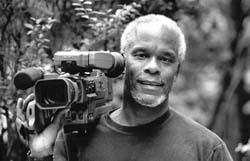 In August 2008, Stanley Nelson, who directed the documentary Jonestown: The Life and Death of Peoples Temple, for PBS’ American Experience series, was asked to reflect upon his work on Peoples Temple, how the project affected his life, how it changed (or confirmed) what he had previously believed about Peoples Temple, how his own perspectives evolved and what they became. Don Beck conducted the following interview.
In August 2008, Stanley Nelson, who directed the documentary Jonestown: The Life and Death of Peoples Temple, for PBS’ American Experience series, was asked to reflect upon his work on Peoples Temple, how the project affected his life, how it changed (or confirmed) what he had previously believed about Peoples Temple, how his own perspectives evolved and what they became. Don Beck conducted the following interview.
––––––––
What drew you to make a documentary about Peoples Temple?
I was 27 in November 1978, so of course I had known all these years about the deaths in Guyana. But it wasn’t until the 25th anniversary of the deaths when I heard radio interviews with some of the survivors, that I realized the people were different from what I had thought. As I looked into it more closely, I became fascinated with the Peoples Temple story and the possibility of a documentary about the people of the Temple.
What did you set about to do?
I wanted a film about the people, something more than an historical bubble. With people still alive to describe it, it could be told by people who were part of the story, from their point of view, what they thought and felt. It could be true to the people we were telling about.
As a story it would reflect on all of our lives. It would relate to the role of religion as more people today look into religious beliefs. The Peoples Temple story could serve as a cautionary tale of where an unquestioning faith can lead.
What did you find drew people to Peoples Temple?
People came for different reasons. Some were thankful to the group for bringing them off drugs; they joined because they were brought off drug dependency. Some were gotten out of jail. Some were taken in and given a place to stay, meals and medical care.
Many people living in Peoples Temple were happy. Communal living, to a degree, worked. It was a good place to be.
Was Peoples Temple a cult?
I don’t know what a cult is. Before the film, I thought I knew; now I’m not sure. The word is used so widely that it almost has no definition. Using the word “cult”doesn’t add to the discussion or give a clearer understanding of who the people of Peoples Temple were.
The documentary starts with a survivor’s statement, “Nobody joins a cult.” People didn’t know Peoples Temple as a “cult.” If it wasn’t a cult at first, at what point did it become a cult? It started out positively, but people were eventually worn down, a slow death of souls.
What points of the film or its making affected you most – or stay with you?
In one recounting, someone was being cruelly criticized and demeaned in a council session. A survivor said he knew it was wrong, but hadn’t done anything to stop it. Questioning and speaking out had been stifled.
I am amazed at how many young people don’t know about Peoples Temple. The phrase, “drink the kool-aid” is known and widely used, but a whole generation doesn’t know where it comes from. After hearing about what happened, most young people just had mouths open in amazement at the story.
Would you do anything differently?
No. The film pretty much did what I had set out to do. Now, people who see Jonestown: The Life and Death of Peoples Temple can see a different picture of Peoples Temple, as seen and told by the people, what they thought and felt – more than the tragic ending.
With the successes of appearing on PBS, showing in theaters across the country, and being considered for the Oscar, the documentary achieved what we set out to do and more.
What kind of follow up would you see for the film? Or not?
A series of outreach activities relating to its showing on the American Experience series on KPBS were widely used. However, we found it difficult to get monies for a fuller program. With another documentary we had made on “hip-hop,” it was fairly easy to get monies for more outreach, but the monies for follow up on Jonestown just weren’t there.
What more lessons can be learned?
Another story yet to be told is that of the survivors, that begins when the Temple ended. How have people survived since then? What do they carry with them?
It would tell of resilience to pick up and carry on – some better than others; to start over again and continue; with family gone, to find jobs and make a new place in a society they had left; how to come to terms with so many things. There is much still to tell, but it needs to be told by someone else.
(Several other interviews with Stanley Nelson appear on the Internet, especially those conducted immediately following the release of his documentary, including one at New England Film.)